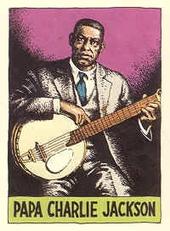~Papa Charlie Jackson 1890~1938 was the real father of the blues, being the first man to succesfully record in 1924 and setting of a craze which would inspire countless others.
~Early years~ Reportedly born in New Orleans little is known about his youth but the young Charlie Jackson was obviously influenced by the combination of early jazz, blues, ragtime, jigs and minstrelsy in that city at the turn of the century. He played the six-string banjo, a hybred insturment also played by Gus Cannon, playing solo as well as with jazz bands like Freddie Keppard and Kid Ory's. Rather than just playing the blues his solo work showed the wide variety of other travelling bluesmen of the Edwardian era such as Henry Thomas, Gus Cannon and Leadbelly although it is not known how widely travelled he was. By the early 1920's he had moved north and settled in Chicago where he made a living playing street corners and rent party's until Paramount records took a chance and started recording him in 1924.
~Recording years~ Jackson was not the first solo bluesman to record, guitarist Sylvester Weaver had recorded a insturmental in 1923 to little notice and Gus Cannon claimed to had recorded before WW1, however if true these recordings have not survived. Jackson's recordings were an immediate success convincing Paramount to step up their blues recordings with other labels soon following suit. Papa Charlie (as he was now billed) recorded some 70 sides mostly as a solo artist but also with singers Ma Rainey and Ida Cox, with Hot Jazz bands and Hokum string bands. His work was unique among banjo players; both crude and sophisticated, both modal and raggy, bluesy and jazzy, with highly dexterous finger picking and simple one string riffs. He continued to record successfully into the blues age.
~Decline~ The great depression hit the recording industry hard, especially rural blues and country singers, and Paramount shut down their recordings by 1932, going bankrupt by 1935. Most bluesmen were forced into retirement but the versitile Jackson continued to find gigs in Chicago and did some jazz recordings for OKeh with Tiny Parham as well as some duets with a young Big Bill Broonzy, although there was now little demand for his solo work which black audiences now considered too backwoods and dated with the banjo having been surplanted by the guitar. His death by natural causes in 1938 went largely un-noted. Perhaps because of his choice of insturment Jackson has not received the posthumous notice of others like Robert Johnson, Charlie Patton or Blind Lemon and his death denied him the chance to be rediscovered in the folk boom of the 1960's when he would have been a natural like Skip James, John Hurt, Gary Davis or Son House. some of his work is available on cd.
